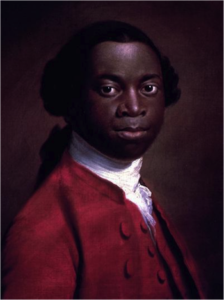
Olaudah Equiano
*On this date in 1745, we remember the birth of Olaudah Equiano, a Black African slave and author.
From Nigeria, Equiano, also known as (Gustavus Vassa), was kidnapped from his village at the age of eleven, shipped through the grueling "Middle Passage" of the Atlantic Ocean, hardened in the West Indies, and sold to a Virginia planter. He was later bought by a British naval Officer, Captain Pascal, as a present for his cousins in London. After ten years of enslavement throughout North America, where he assisted his merchant slave master and worked as a seaman, Equiano bought his freedom.
At forty-four, he published his autobiography, The Interesting Narrative of the Life of Olaudah Equiano, Or Gustavus Vassa, The African. He registered this writing at Stationer’s Hall, London, in 1789. More than two centuries later, his work was recognized not only as one of the first works written in English by a former slave but, perhaps more importantly, as the paradigm of the slave narrative, a (then) new literary genre. In his narrative, Equiano recalls his childhood in Essaka (an Igbo village formerly in northeast Nigeria), where he was adorned in the tradition of the "greatest warriors."
He was unique in remembering traditional African life before the advent of the European slave trade. Equally significant is Equiano’s life on the high seas, which included travels throughout not only the Americas, Turkey, and the Mediterranean but also participation in major naval battles during the French and Indian War (Seven Years’ War) and the search for a northwest passage led by the Phipps expedition of 1772-1773.
Equiano also records his central role, along with Granville Sharpe. As a significant voice in this movement, Equiano petitioned the Queen of England in 1788. He was appointed to the expedition to settle London’s poor Blacks in Sierra Leone, a British colony on the West Coast of Africa. Sadly, he did not complete the journey back to his native land. Equiano’s autobiography became a best-seller, equal (at the time) in popularity to Robinson Crusoe.
He published nine different editions before his death, including an American edition (1791) and German and Dutch editions, 1790 and 1791, respectively. Olaudah Equiano died in 1797. By 1837, nine more editions had been published.
Africana The Encyclopedia of the African and
African American Experience
Editors: Kwame Anthony Appiah and Henry Louis Gates Jr.
Copyright 1999
ISBN 0-465-0071-1